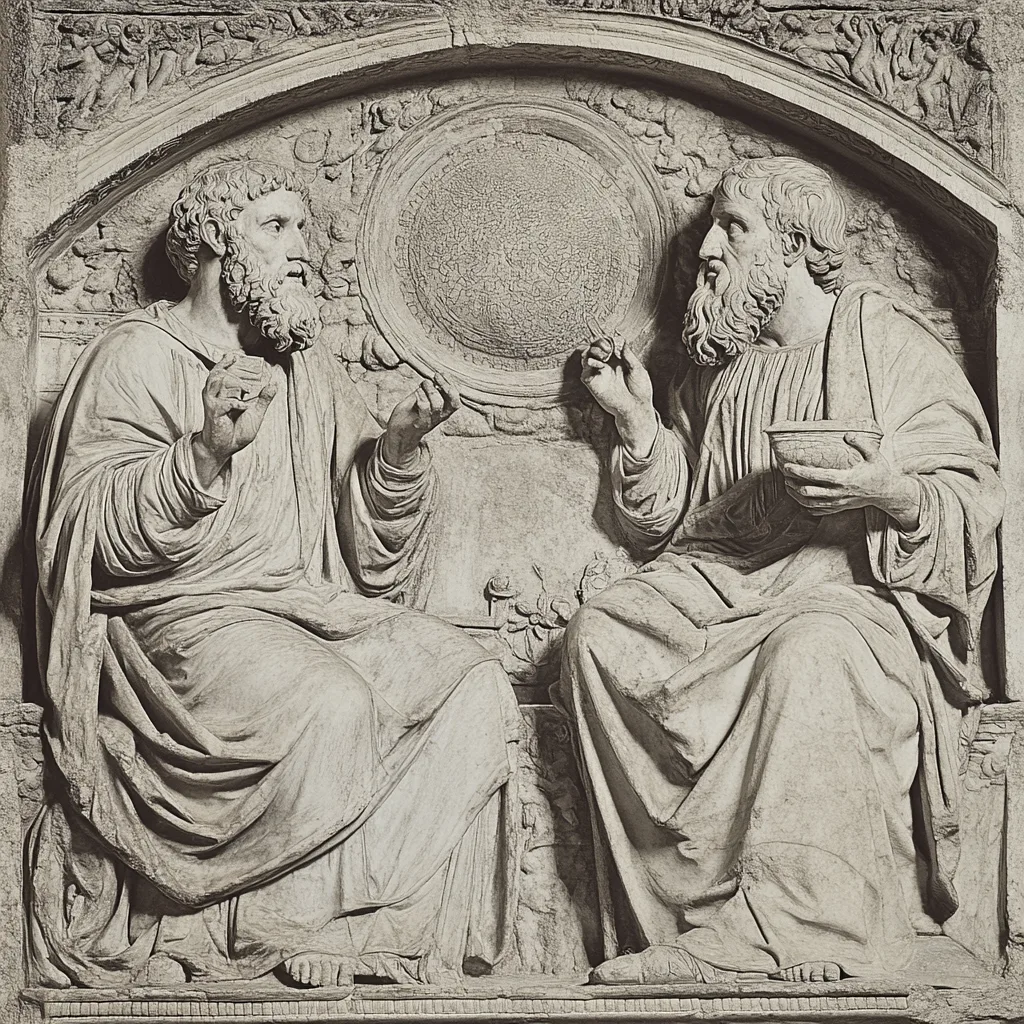Paths Christians Take When They Encounter Evolutionary Theory
As a student in Seminary, I’m surrounded by the theological debates of the
day. Within Reformed circles, the debates mainly revolve around confessional subscription, Sabbath observance, and the doctrine of sanctification. But, more Church-universal issues are centered around things like doctrine of Scripture, the nature of authority, cessation and continuation of spiritual gifts, doctrine of atonement, doctrine of the application of Christ’s atonement, and lastly, the nature of Adam. It is this last problem that I wish to discuss here. Why? I write because I want to show the multiple paths Christians can take when they read about evolution, and then weigh the value of each of these paths.
There are at least four paths Christians travel when presented with the data used by evolutionary biologists. One option is to look at this data, accept evolutionary theory as gospel, and abandon Christianity. A second option is to look at the data, accept the theory as gospel, and then attempt to reconcile this theory with Christianity. A third option is to view the theory as tentative but unlikely, and maintain Christianity. A fourth option is to utterly reject the theory and maintain Christianity.
Path One: Accept Evolutionary Theory and Abandon Christianity
This path is often traveled by men and women who grew up in Christian circles where they were taught a twenty-four hour view of creation days, and a literal first and singular Adam. They read some articles online, or watch a video on YouTube, and find out that we have assembled a variety of human skulls and bodies that appear to be quite different than contemporary human skulls and bodies. Out of the abundance of this material, scientists have posited that various groups of pre-homo sapiens existed in various placed across the world, but that through interbreeding and natural selection, our current day species developed. Further, current genetic studies seem to suggest that a singular Adam and a singular Eve could not have provided enough genetic material to give us our current varieties. Faced with these ideas, many people simply reject the Scriptures as obviously contradicting the evidence for human evolution. They then go the next step and say, “If Scripture is wrong about Adam, then clearly it’s wrong about everything else.” It is often these people who spill out surprisingly bitter rhetoric towards the Bible, and towards Christians. They suppose that the Bible can be nothing but a bunch of fairy-tales, a book written by primitive homo sapiens with wishful thinking about where things came from, and where things are going. But this isn’t the only path that can be, or should be, taken. I will show you a better way.
Path Two: Accept Evolutionary Theory and Reconcile Christianity
This path has become quite popular. BioLogos, N.T. Wright, Pete Enns, and John Walton are just a few organizations and names that now promote this second road. The way to this path seems logical enough. The evidence for human evolution seems overwhelming and convincing. But instead of simply throwing out your Bible, you think about your interpretation of the Bible. Perhaps, I have simply been viewing Genesis 1-3 incorrectly. Perhaps, the author uses the word “day” for reasons other than a 24 hour period of time. Perhaps, the author speaks of an individual Adam for reasons other than a literal history lesson. And there you have it. The road is now being traveled.
What is interesting to me is that these arguments are primarily panned out through the lens of grammatical-historical exegesis. That is, in this second view, people approach Genesis 1-3 from a literary and historical framework in order to prove their position. They don’t want haphazard arguments, half-baked theories, or arbitrary patristic citations to support their views. They want to make sure that Scripture actually promotes their understanding. At least, the honest ones want to do this. Sometimes, one can’t help but wonder if this is a kind of salving of the conscience: We’d really look like nincompoops to our culture if we don’t accept this theory. So, let’s accept it, appear more intelligent and reasonable, and see if we can reconcile it to Scripture. If I can reconcile it to Scripture through literary methods and history, then I can maintain my reputation in the culture, and remain a Christian. But we really can’t know the intentions of the human heart. Maybe you’re on this path, and you really think that the intent of the author of Genesis is to promote a kind of mythological, theological generalization: By telling this story, we learn that God made everything. God subdued and filled everything. And God made mankind for the purpose of doing the same thing on this particular planet, spreading worshippers across the globe. But if you’re wondering whether or not to hold this view, I will show you a most excellent way.
Path Three: Treat Evolutionary Theory as Tentative and Unlikely, and Maintain Christianity
This third path takes a hard look at the evidence for the theory of human evolution, and concludes humbly. It recognizes the intelligence of the men and women who propound evolutionary theory, looks at the evidence, and yet remains unpersuaded. At the same time, it doesn’t use hyped-up and defensive rhetoric against this theory. This theory is sincerely fascinating. At the same time, a theory like this is supremely difficult to prove. It is almost arrogance to suggest that from the data we currently possess, we can compose a history of the human race. Humility desires free inquiry, and is more patient in its assertions about historical fact. Frankly, this author currently walks this path. Human evolution isn’t proven, but it is an interesting idea.
Meanwhile, this allows the Christian to analyze the discussions of the people on path number two. Are they really bringing up valid insights in regards to the literary nature of Genesis 1-3? Is the author honestly intending this part of Genesis to be mythopoeiac? And, seriously, doesn’t that reading do a number on our Pauline exegesis, and the rest of our biblical exegesis? When you take a look at Paul’s use of Genesis in Romans 5, or in 1 Corinthians 15, or in 1 Timothy 2 there are really only a few conclusions: either Paul believed this was mythological, and was using this mythical story as an example, or Paul believed Adam was historical, and on that basis, was using Adam as a type. It is clear, though, that Paul is using this as typology. If Adam is figurative, then the typological use falls apart. All typology is based in history, not in metaphor.
And a mythological approach doesn’t just undo Paul’s exegesis, it undoes the rest of the Biblical authors’ exegesis. For starters, Genesis 5 is the book of Adam. Unless you’re willing to extend the mythological boundaries of Genesis to chapter 11, Genesis 5 is about a historical figure. Next, 1 Chronicles 1:1 begins its genealogy, composed of historical figures, with that of Adam. Further, Luke’s genealogy in Luke 3:38, lists Adam as the first human, “the son of God”. Last, Jude 14 references Enoch as the seventh generation from Adam. Each of these authors clearly understood Adam as a historical figure.
Further, second-pathers, can’t you see the slippery slope of choosing which portions of Scripture are “mythological”? Hasn’t Bultmann done enough damage? Aren’t you unhappy with the mythicists? It seems almost inevitable that when we take one historical figure who doesn’t fit into our scientific schema, and then mythologize that figure, we’ll start doing it with others who don’t fit. A person who is raised from the dead, for instance, doesn’t fit with current evidence. People don’t come back to life after they die. They stay dead. So, perhaps the authors never really intended to mean that Jesus lived again, physically, after death. Maybe they were just using the Gnostic Redeemer myth, a convention of the day, to explain a kind of hope for the future? Thus, the way to reconcile something that is uncomfortable when presented as history is to deny that it is history. So, the second approach falls short in that it has to do a lot of literary legwork, and bend the authorial intent, to promote its views. Thus, the third view seems to be the most appropriate.
But this isn’t the last approach. There is one more, and final, approach that many Christians make when confronted with evidence for evolutionary theory.
Path Four: Utterly Reject Evolutionary Theory, and Maintain Christianity
This is the opposite extreme of path one. People in both path one and path four look at the arguments for evolution and believe that it is irreconcilable with the claims of Scripture. One rejects Christianity. The other rejects evolutionary theory. But doesn’t the third path do the same? No, not quite. This fourth path is mainly distinguished from the third path by exegetical approach and by attitude. In regards to attitude, this is the way of the one who simply knows that this theory is wrong, and won’t even consider it. It isn’t worth looking into, and it will certainly not be taught in this household. And usually this attitude arises from an exegetical approach. Genesis clearly is historical narrative in this view, and the days are plainly 24-hours long, therefore evolutionary theory is wrong. It isn’t willing to reason with other views. But I’ve framed most of this negatively. Positively, this path seeks to preserve the historicity of Scripture, and maintains its beliefs in the face of public anger. If you find yourself on this path, I salute you because you stick so firmly to your faith, despite our culture’s persistent pecking and bitterness against non-evolutionary views of humanity. At the same time, we must be careful to guard against ungodly attitudes towards others, and to be willing to listen to reasonable arguments. You will not typically persuade others to become Christians if you know nothing of their beliefs, and show a lack of care about their beliefs.
It’s clear, then, that some people take different roads when they encounter evidence for evolutionary theory. So, which path do you travel, and why? I’m interested in your stories, and would love to
talk to anyone about evolutionary theory and its relation to Christianity.



Leave a Reply